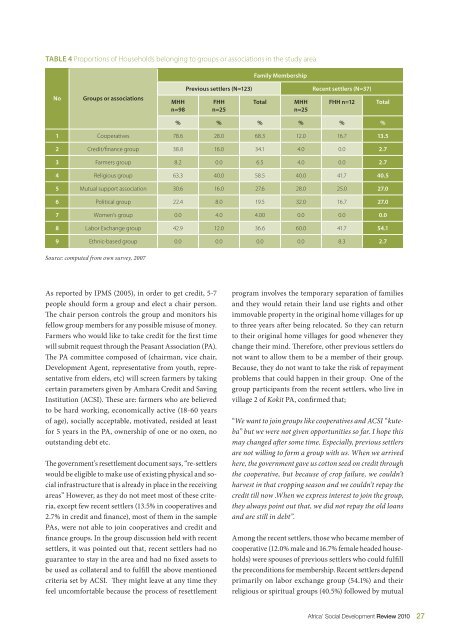The African Social Development Review - United Nations Economic ...
The African Social Development Review - United Nations Economic ...
The African Social Development Review - United Nations Economic ...
Create successful ePaper yourself
Turn your PDF publications into a flip-book with our unique Google optimized e-Paper software.
TABLE 4 Proportions of Households belonging to groups or associations in the study areaFamily MembershipNoGroups or associationsMHHn=98Previous settlers (N=123)FHHn=25TotalMHHn=25Recent settlers (N=37)FHH n=12Total% % % % % %1 Cooperatives 78.6 28.0 68.3 12.0 16.7 13.52 Credit/finance group 38.8 16.0 34.1 4.0 0.0 2.73 Farmers group 8.2 0.0 6.5 4.0 0.0 2.74 Religious group 63.3 40.0 58.5 40.0 41.7 40.55 Mutual support association 30.6 16.0 27.6 28.0 25.0 27.06 Political group 22.4 8.0 19.5 32.0 16.7 27.07 Women’s group 0.0 4.0 4.00 0.0 0.0 0.08 Labor Exchange group 42.9 12.0 36.6 60.0 41.7 54.19 Ethnic-based group 0.0 0.0 0.0 0.0 8.3 2.7Source: computed from own survey, 2007As reported by IPMS (2005), in order to get credit, 5-7people should form a group and elect a chair person.<strong>The</strong> chair person controls the group and monitors hisfellow group members for any possible misuse of money.Farmers who would like to take credit for the first timewill submit request through the Peasant Association (PA).<strong>The</strong> PA committee composed of (chairman, vice chair,<strong>Development</strong> Agent, representative from youth, representativefrom elders, etc) will screen farmers by takingcertain parameters given by Amhara Credit and SavingInstitution (ACSI). <strong>The</strong>se are: farmers who are believedto be hard working, economically active (18-60 yearsof age), socially acceptable, motivated, resided at leastfor 5 years in the PA, ownership of one or no oxen, nooutstanding debt etc.<strong>The</strong> government’s resettlement document says, “re-settlerswould be eligible to make use of existing physical and socialinfrastructure that is already in place in the receivingareas” However, as they do not meet most of these criteria,except few recent settlers (13.5% in cooperatives and2.7% in credit and finance), most of them in the samplePAs, were not able to join cooperatives and credit andfinance groups. In the group discussion held with recentsettlers, it was pointed out that, recent settlers had noguarantee to stay in the area and had no fixed assets tobe used as collateral and to fulfill the above mentionedcriteria set by ACSI. <strong>The</strong>y might leave at any time theyfeel uncomfortable because the process of resettlementprogram involves the temporary separation of familiesand they would retain their land use rights and otherimmovable property in the original home villages for upto three years after being relocated. So they can returnto their original home villages for good whenever theychange their mind. <strong>The</strong>refore, other previous settlers donot want to allow them to be a member of their group.Because, they do not want to take the risk of repaymentproblems that could happen in their group. One of thegroup participants from the recent settlers, who live invillage 2 of Kokit PA, confirmed that;“We want to join groups like cooperatives and ACSI “kuteba”but we were not given opportunities so far. I hope thismay changed after some time. Especially, previous settlersare not willing to form a group with us. When we arrivedhere, the government gave us cotton seed on credit throughthe cooperative, but because of crop failure, we couldn’tharvest in that cropping season and we couldn’t repay thecredit till now .When we express interest to join the group,they always point out that, we did not repay the old loansand are still in debt”.Among the recent settlers, those who became member ofcooperative (12.0% male and 16.7% female headed households)were spouses of previous settlers who could fulfillthe preconditions for membership. Recent settlers dependprimarily on labor exchange group (54.1%) and theirreligious or spiritual groups (40.5%) followed by mutualAfrica’ <strong>Social</strong> <strong>Development</strong> <strong>Review</strong> 201027
















